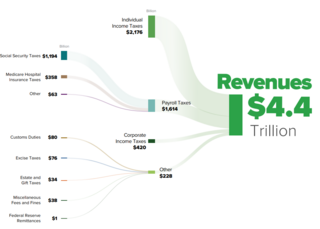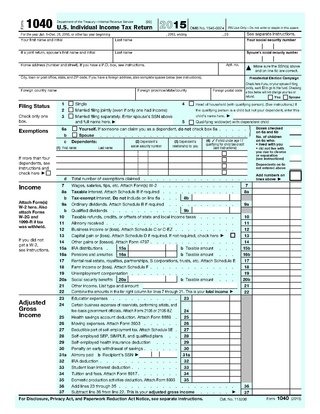
The United States has separate federal, state, and local governments with taxes imposed at each of these levels. Taxes are levied on income, payroll, property, sales, capital gains, dividends, imports, estates and gifts, as well as various fees. In 2020, taxes collected by federal, state, and local governments amounted to 25.5% of GDP, below the OECD average of 33.5% of GDP.
A flat tax is a tax with a single rate on the taxable amount, after accounting for any deductions or exemptions from the tax base. It is not necessarily a fully proportional tax. Implementations are often progressive due to exemptions, or regressive in case of a maximum taxable amount. There are various tax systems that are labeled "flat tax" even though they are significantly different. The defining characteristic is the existence of only one tax rate other than zero, as opposed to multiple non-zero rates that vary depending on the amount subject to taxation.
An income tax is a tax imposed on individuals or entities (taxpayers) in respect of the income or profits earned by them. Income tax generally is computed as the product of a tax rate times the taxable income. Taxation rates may vary by type or characteristics of the taxpayer and the type of income.
A dividend tax is a tax imposed by a jurisdiction on dividends paid by a corporation to its shareholders (stockholders). The primary tax liability is that of the shareholder, though a tax obligation may also be imposed on the corporation in the form of a withholding tax. In some cases the withholding tax may be the extent of the tax liability in relation to the dividend. A dividend tax is in addition to any tax imposed directly on the corporation on its profits. Some jurisdictions do not tax dividends.
A tax deduction or benefit is an amount deducted from taxable income, usually based on expenses such as those incurred to produce additional income. Tax deductions are a form of tax incentives, along with exemptions and tax credits. The difference between deductions, exemptions, and credits is that deductions and exemptions both reduce taxable income, while credits reduce tax.
Tax noncompliance is a range of activities that are unfavorable to a government's tax system. This may include tax avoidance, which is tax reduction by legal means, and tax evasion which is the illegal non-payment of tax liabilities. The use of the term "noncompliance" is used differently by different authors. Its most general use describes non-compliant behaviors with respect to different institutional rules resulting in what Edgar L. Feige calls unobserved economies. Non-compliance with fiscal rules of taxation gives rise to unreported income and a tax gap that Feige estimates to be in the neighborhood of $500 billion annually for the United States.
Negative gearing is a form of financial leverage whereby an investor borrows money to acquire an income-producing investment and the gross income generated by the investment is less than the cost of owning and managing the investment, including depreciation and interest charged on the loan. The investor may enter into a negatively geared investment expecting tax benefits or the capital gain on the investment after it is sold to exceed the accumulated losses of holding the investment. The investor would take into account the tax treatment of negative gearing, which may generate additional benefits to the investor in the form of tax benefits if the loss on a negatively geared investment is tax-deductible against the investor's other taxable income and if the capital gain on the sale is given a favourable tax treatment.

Corporation tax in the United Kingdom is a corporate tax levied in on the profits made by UK-resident companies and on the profits of entities registered overseas with permanent establishments in the UK.
The Internal Revenue Code of 1986 (IRC), is the domestic portion of federal statutory tax law in the United States. It is codified in statute as Title 26 of the United States Code. The IRC is organized topically into subtitles and sections, covering federal income tax in the United States, payroll taxes, estate taxes, gift taxes, and excise taxes; as well as procedure and administration. The Code's implementing federal agency is the Internal Revenue Service.

The United States federal government and most state governments impose an income tax. They are determined by applying a tax rate, which may increase as income increases, to taxable income, which is the total income less allowable deductions. Income is broadly defined. Individuals and corporations are directly taxable, and estates and trusts may be taxable on undistributed income. Partnerships are not taxed, but their partners are taxed on their shares of partnership income. Residents and citizens are taxed on worldwide income, while nonresidents are taxed only on income within the jurisdiction. Several types of credits reduce tax, and some types of credits may exceed tax before credits. Most business expenses are deductible. Individuals may deduct certain personal expenses, including home mortgage interest, state taxes, contributions to charity, and some other items. Some deductions are subject to limits, and an Alternative Minimum Tax (AMT) applies at the federal and some state levels.
Income tax in Australia is imposed by the federal government on the taxable income of individuals and corporations. State governments have not imposed income taxes since World War II. On individuals, income tax is levied at progressive rates, and at one of two rates for corporations. The income of partnerships and trusts is not taxed directly, but is taxed on its distribution to the partners or beneficiaries. Income tax is the most important source of revenue for government within the Australian taxation system. Income tax is collected on behalf of the federal government by the Australian Taxation Office.

The Income Tax Assessment Act 1936 (Cth) is an Act of the Parliament of Australia. It is one of the main statutes under which income tax is calculated. The Act is gradually being rewritten into the Income Tax Assessment Act 1997, and new matters are generally now added to the 1997 Act.
Income taxes in Canada constitute the majority of the annual revenues of the Government of Canada, and of the governments of the Provinces of Canada. In the fiscal year ending March 31, 2018, the federal government collected just over three times more revenue from personal income taxes than it did from corporate income taxes.

Income tax in India is governed by Entry 82 of the Union List of the Seventh Schedule to the Constitution of India, empowering the central government to tax non-agricultural income; agricultural income is defined in Section 10(1) of the Income-tax Act, 1961. Income-tax law consists of the 1961 act, Income Tax Rules 1962, Notifications and Circulars issued by the Central Board of Direct Taxes (CBDT), annual Finance Acts, and judicial pronouncements by the Supreme and high courts.
Under the United States taxation system, an enterprise may deduct business expenses from its taxable income, subject to certain conditions. On occasion the Internal Revenue Service (IRS) has challenged such deductions, regarding the activities in question as illegitimate, and in certain circumstances the Internal Revenue Code provides for such challenge. Rulings by the U.S. Supreme Court have in general upheld the deductions, where there is not a specific governmental policy in support of disallowing them.
Taxation of illegal income in the United States arises from the provisions of the Internal Revenue Code, enacted by the U.S. Congress in part for the purpose of taxing net income. As such, a person's taxable income will generally be subject to the same federal income tax rules, regardless of whether the income was obtained legally or illegally.
Taxation in Finland is mainly carried out through the Finnish Tax Administration, an agency of the Ministry of Finance. Finnish Customs, the Finnish Transport and Communications Agency Traficom, and pension funds also collect taxes. Taxes collected are distributed to the Government, municipalities, church, and the Social Insurance Institution, Kela.
Taxes in Germany are levied at various government levels: the federal government, the 16 states (Länder), and numerous municipalities (Städte/Gemeinden). The structured tax system has evolved significantly, since the reunification of Germany in 1990 and the integration within the European Union, which has influenced tax policies. Today, income tax and Value-Added Tax (VAT) are the primary sources of tax revenue. These taxes reflect Germany's commitment to a balanced approach between direct and indirect taxation, essential for funding extensive social welfare programs and public infrastructure. The modern German tax system accentuate on fairness and efficiency, adapting to global economic trends and domestic fiscal needs.

Commissioner of Taxation v La Rosa was a 2003 decision of the Federal Court of Australia, sitting as the Full Court of the Federal Court. The court upheld two earlier rulings that Frank La Rosa, a convicted heroin dealer, was entitled to a tax deduction of $220,000 for money stolen from him during a drug deal. As a result of the decision, the federal government amended the Income Tax Assessment Act 1997 to prevent similar deductions being made.
The Research and Development Tax Incentive (R&D) is a government programme that aims to stimulate Australian investment in R&D. It has been in place since 1 July 2011 and replaced the R&D Tax Concession. The tax incentive reduces company R&D costs by offering tax offsets for eligible R&D expenditure. The tax incentive is jointly administered by Industry Innovation and Science Australia (IISA) and the Australian Taxation Office (ATO).





